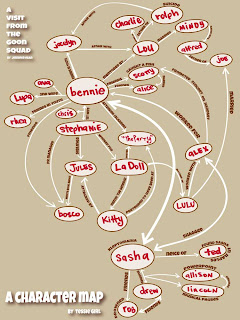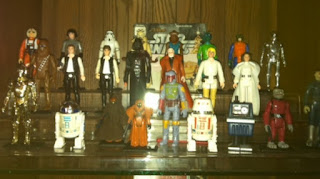'Zou Bisou Bisou,' or Subtlety In Writing
A big part of what I like to write about in this blog is what interests me in the moment, and how that impacts my writing, and maybe yours. Much has been said that this last decade or so has been the 'Golden Age of Television.' There is no denying that, not with The Wire, Deadwood, The Sopranos, and certainly, Mad Men, which returned last night after nearly two years with a fantastic example of why the writing on television is quite possibly the best writing that's happening anywhere.
That's not to leave fiction lovers or writers out. There's lots to take away from TV, as there is any medium. Cinema and now television have always presented an aesthetic challenge to literature - the axiom 'Show, Don't Tell' is simply a fact of life in motion pictures as opposed to a rule (well - ok, it's not, but by virtue of its nature, the camera eliminates the need for the kind of scene setting that was expected and necessary in literature in the past, and really, still is today).
Great writing, in any medium, is subtle. Last night's Mad Men was a perfect example of this. The scene above is both the least subtle scene in the show - the series? - and one of its most subtle. Instantly generating internet buzz around the country, Jessica Pare undid the Freedom Fries debacle of a few years ago in less than two minutes by making all things French very, very cool again through a little song called 'Zou Bisou Bisou.' Just watch it. Trust me.
Out of context, it may be hard to see get a full picture of what's going on, but the scene represents the intersection of a woman asserting herself in a very direct way to her husband, in public, in the mid 60's as the Women's Movement and the Civil Rights Movement begin to gather steam. The scene represents the conflict between traditional society and counter culture - among the crowd are a sailor bound for Vietnam, a black gay musician, and of course, Jessica - and it represents what must certainly be the turning point in the series itself. Until now, Don Draper has been a very private man. To the point of exhaustion. Now, regardless of whether he wants it or not, Don is on full display. His life is. Everyone sees his life - a very good, good life - and he is no longer in control.
We don't see how true this is until the aftermath of the party, when another very subtle scene drops a bomb on us: through some deft dialogue, we realize Don has told his new wife his secret. He is Dick Whitman. She uses it, ultimately, as a taunt; the party and her performance can be seen the same way. Outwardly, Don appears to have found a measure of calm and happiness. His life is back in order. Inside this marriage, he has ceded control of his very identity - all he is - to someone of a generation that is about to rip the identity of a nation right off its bones.
The show does this without virtually saying a word. This can be done in fiction as well; the best writers do it. Hemingway, famously does so in "Hills Like White Elephants," in which two characters have a conversation about an abortion that is never spelled out on the surface. In a short story, this obviously packs a dramatic punch. In a novel, or television series, the accumulation of drama - of what you know of these people - impinges on the work in such a way that scenes of great subtlety become like the icons of advertising brands. They're everywhere, but you don't see them.


Comments